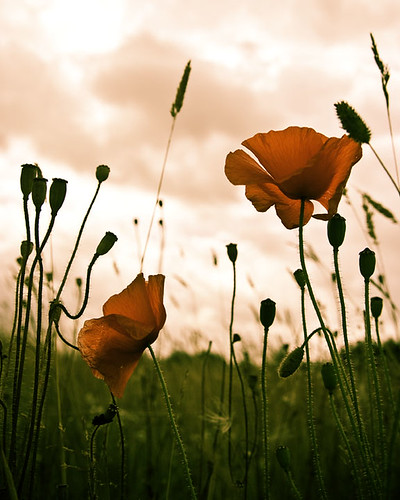He’s
told me this story before. It’s the only
story of his time serving overseas he has ever shared with me. Working in heavy
machinery, he doesn’t have thrilling tales of firefights or diving into
foxholes, no daring accounts of storming stoney beaches with surf thundering
around his waist and bullets whistling overhead. And I am glad. I want a
lifetime of safety for my grandfather.
The last time he told me this story I was a child. He
laughed. We all laughed. He told the
tale as a joke, a humourous memory of one late night in France. But now I am
older, he is older. No longer a child, I am now a mother with children of my
own. And my grandfather? He is now older than nearly everyone I have ever
known, older than his neighbours, older than most of the people at his church
and mine. He has lived longer than most people are able, a fact which fills me
with pride. My gloriously old grandfather. My strong grandfather. Full of days.
But he tells me this story again, but without the laughter.
This is no joke, no happy memory. His wrinkled face grey with remembered fear,
his eyes looking back over an ocean, over years, over lifetimes of children and
grandchildren and great-grandchildren, as he recounts for me again that night.
How he and two buddies had left where they were stationed to go to the local
bar. How he and one of the buddies had to carry the other back to his bunk, he
was so drunk. How there was a small bridge over a shallow creek between them
and their destination.
How the air raid sirens blared as they were crossing the
bridge. How they heard the roar of the engines of the Luftwaffe overhead.
How they both dropped the drunk buddy in the middle of the
bridge and each dove off a side.
How he thought he was leaving his buddy to die, because he
could not save him, and himself.
It was a nuisance raid. He wasn’t fired upon. They pulled
themselves out of the creek bed, damp and muddy but uninjured, picked up their
friend and continued back to their bunks. Just another night out in France
during the war. And he laughed about it for years.
Until he couldn’t. Until the weight of knowing how close he
came, of knowing how easily the story could have ended so very, very
differently proved too great. And he does not laugh as he tells me the story
now.
As a child, at school on Remembrance Day we sang songs written by flowerchildren – Where Have All the Flowers Gone, and One Tin Soldier, and How Many Roads – and we watched videos from WarAmps declaring “Never Again” and we stood solemnly. I tried to remember. I tried to muster up feelings of sadness for this annual national funeral. I tried to think somber thoughts and really remember, whatever that means to a child of 9 who has never seen a war, never lost family to conflict, never experienced violence. I fought to find tears of grief for a grief inconceivable to me. After all, my grandfather came back. I am here because he survived.
Now, I have watched footage of Canadians in Iraq and Kuwait,
in Bosnia, in Somalia. I have watched us participate in the invasion of
Afghanistan. And I have watched Remembrance Day change. It no longer
feels like the national funeral it once did, a national day of mourning not
only the dead but the sheer senselessness of war, the utter absurdity of
rallying scores of people to die violent deaths and return that violence with violence.
In our attempt to stand in solidarity with our servicemen and women we have
lost the songs of flowerchildren, the knowledge as clear as the keening of
birds that war is always terrible, always a sign of our human failing to live
as humans should. We have come to the mistaken belief that it dishonours our
current servicemen and women to decry the horrors of violence and war, that in
order to stand in solidarity with them we must clasp and raise and shake our
hands, crying out at the might of our nation. But we dishonour them when we
dismiss what they have done and seen, things that can not be unseen, which
cannot be forgotten. We dishonour them
when we cry out that we must make more war. We dishonour them when we forget
the lessons past generations spent so long teaching us.
I no longer fight to find the tears. They come easily and
unbidden and I fight to hide them. As my
grandfather fights to hide his tears as he tells me his story, his lasting
memory, raw and unforgettable, while his great-grandchildren laugh and play on
the other side of the room. Seventy years later, he has not forgotten. We must
not either.


Never again. Your story, your grandfathers story, brought tears to my eyes. We live surrounded with the memories of two world wars. It is true, it is as you get older and have children and see what wars do and did, that you really understand: never again. Still, it remains so important never to forget and to keep telling our children about the devastation a war brings. I read a story this weekend about a guide working at Flanders Fields museum that once he took a group of 79 dutch students to one of the 'smaller' war cemeteries where exactly 79 soldiers were buried. That was an experience those students will never forget.
ReplyDeleteBye,
Marian